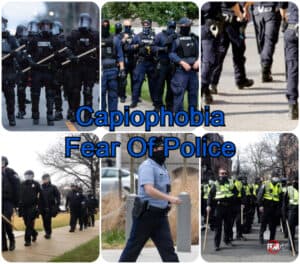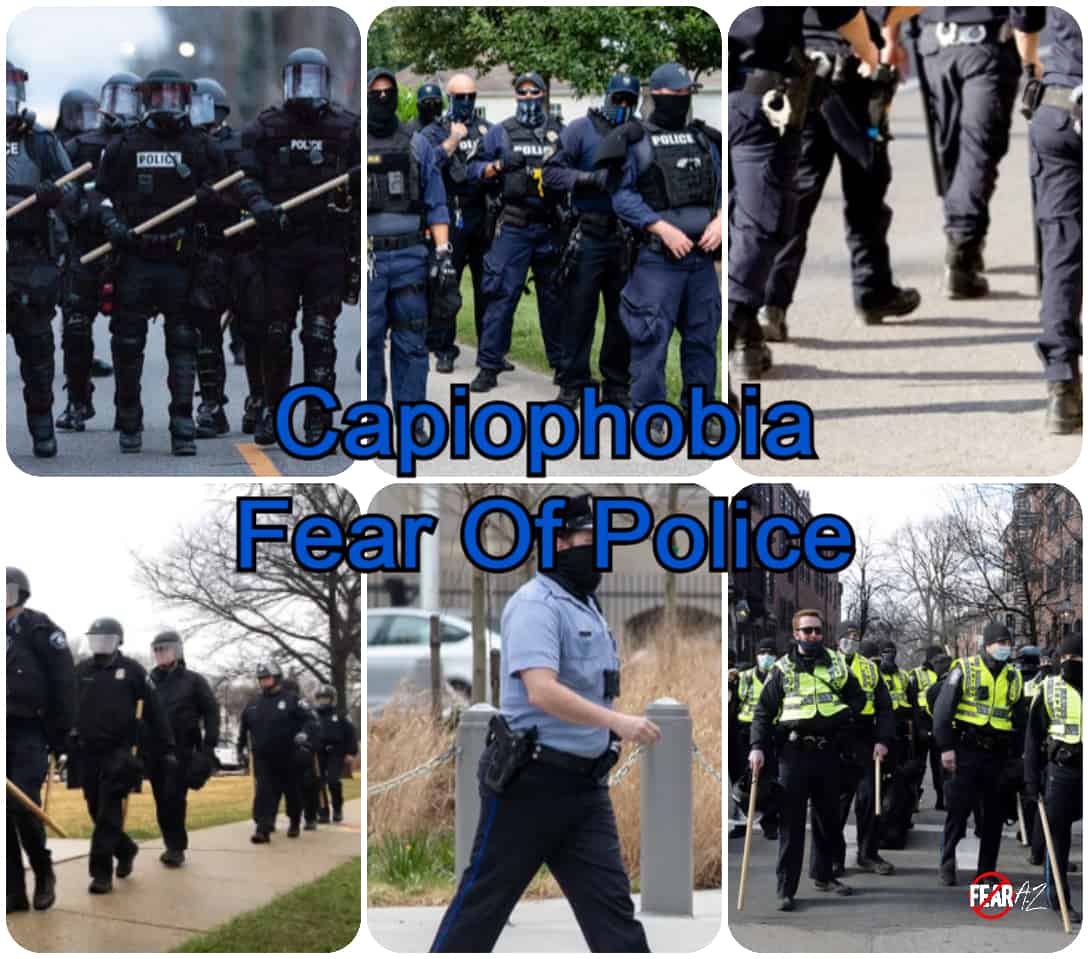Share This Article
Capiophobia: Police Are Here to Help, Not Cause Fear
Does the sight of a police officer send chills down your spine? Have you ever scrambled to change the channel when you see a TV show or movie with cops in it? Do you find yourself feeling anxious or overwhelmed when you spot a police officer, even when you have done nothing wrong?
Does your heart beat out of control if you get pulled over for a traffic issue?
If yes, you may be suffering from capiophobia, the fear of police.
Most of us feel anxious around cops, which is perfectly normal. But having a phobia of police officers can raise this anxiety to unhealthy levels.
Those around you may not relate to the extreme anxiety you experience even at the thought of passing by a cop car, or even worse, getting pulled over by the police. This can make it difficult for you to convey your feelings to friends or family or reach out for help.
But don’t worry; you’re not alone. A large proportion of the global population is suffering from different kinds of phobias, including capiophobia. So, there are plenty of resources available that can help you deal with this fear.
With a little determination, initiative, and some professional intervention, you may soon walk by a policeman without the urge to run in the opposite direction!
What Is Capiophobia?
Capiophobia comes from the Latin word capio meaning “arrest” and the Greek word phobos meaning phobia. So, capiophobia is essentially the fear of being arrested.
People suffering from this phobia feel paranoid at the sight of the police. A knock at the door may terrify them, because they are always worried that it may be the cops. Driving is not easy for them either, because they are anxious about getting pulled over.
Those suffering with this phobia cannot stand the sight of a police car or a police officer and may turn in the opposite direction. Just hearing the sound of a police siren can send them into a panic.
Rationally, we all know that cops are supposed to be there for our protection. And avoiding them is almost impossible. But those with capiophobia will try everything they can to do just that. Since they know the chance of encountering a police officer outside their homes is very high, they may avoid going out at all. They may even order essentials at their doorstep and refuse to socialize.
However, this is no solution. The longer the person avoids facing their fear, the more difficult overcoming it can be. It’s important to express your thoughts and feelings and seek treatment as soon as possible.

Causes of Capiophobia
While the exact cause of any anxiety phobia, including capiophobia, can’t be determined, there are several theories that help us understand this phobia a bit better.
Capiophobia may develop in people who often get in trouble, as well as those who never get in trouble. But there are two major factors that, either by themselves or together, may lead to capiophobia.
Environmental Factors
The development of this fear has a lot to do with encountering police brutality, either personally or on the news and other social media channels. Past bad experiences with the police can also lead to a person fearing and avoiding the police.
Similarly, reading or watching news of police brutality, discrimination, assault, etc. may cause a person to fear the police. Watching someone close go through terrifying ordeals like an unlawful arrest or police brutality can also lead to the development of the phobia.
Unfortunately, police officers sometimes misuse their authority. Recent incidents like the one in Minneapolis involving George Floyd is an example of that. Such incidents of racial injustice, prejudice, and lack of compassion from law enforcement all contribute to a fear of police.
Also, people of color are more fearful of police and more likely to develop this phobia than white people. However, this does not mean white people are spared from the phobia.
Genetic Factors
Your genes have a lot to do with how you handle stress. While for some, dealing with stressful situations is simply a minor inconvenience or a challenge to overcome, for others, it can be a cause of great mental distress.
One with a familial history of mental illness is more prone to developing phobias in response to stress. Their perception and response to incidents of police injustice may be more severe, and they are more susceptible to anxiety disorders such as capiophobia.
Symptoms of Capiophobia
The symptoms of capiophobia are not very different from other types of anxiety phobias. Some of the most common symptoms are:
Physical Symptoms
- Shivering
- Racing heartbeat
- Sweating
- High blood pressure
- Palpitations
- Difficulty breathing
- Nausea
- Vomiting
- Body pain
- Upset stomach
Mental/Emotional Symptoms
- Anxiety
- Panic attack
- Morbid thoughts
- Irritability
- Anti-social behavior
- Poor concentration
- Fear of dying
Treatment of Capiophobia
There are two main ways in which you can help yourself manage your phobia of getting arrested: self-help and professional treatment.
Self-Help
Self-help is one of the best ways of dealing with any phobia. Because you know your triggers and the intensity of your fear, you can develop an action plan that will help you gradually overcome it. With self-help, you can determine your own pace and work on yourself in comfort.
Some things you can do to help yourself are:
- Keep a journal and document all your reactions, triggers, progress, etc.
- Try to reduce your stress levels with meditation and exercise.
- Rationalize your thoughts by rereading your previous journal entries and understanding how you could have acted otherwise.
- Try relaxation techniques like deep breathing, counting numbers, etc.
Professional Help
Mental health professionals have expertise in the field and will help you address and better manage the various symptoms of capiophobia. Your therapist may use one of the following methods to help you deal with your fear:
- Cognitive behavioral therapy
- Exposure therapy
- Talk therapy
- Psychotherapy
- Counseling
Anti-anxiety or antidepressant medications may be prescribed temporarily if you are suffering from severe anxiety or panic attacks.
Learning to Cope with Capiophobia
Living with capiophobia can be difficult. However, giving yourself time, being patient, and being consistent in your efforts to get well can help you make significant strides in your recovery. Talk to your loved ones, and don’t hesitate to seek help.
The journey to a better you can be long, so patience will be an asset. Keep your focus on the goal and work towards a better tomorrow.
Conclusion
While people may laugh off your fear of the police, it’s a real phobia that affects many and can be a source of great stress. However, with the right approach and regular treatment, you can be well on your way to a happier, healthier life. And who knows, one day you may even be able to watch Law & Order without flinching.



